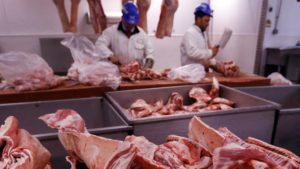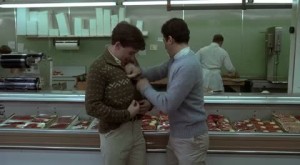Heston Blumenthal is like a rock star of the cooking world, and so is his food.
 No, this is what a rock star looks like (right, exactly as shown).
No, this is what a rock star looks like (right, exactly as shown).
But there’s one thing he wishes people would stop doing in his restaurants — taking pictures of their food.
“Chefs always have this problem now, it’s across the board and you can’t control people,” he told news.com.au while in Melbourne to film Heston Week which starts tonight on MasterChef. “
“I would prefer if they (diners) didn’t take any photos and just enjoyed themselves at the table and certainly not take them throughout the whole meal.
I’d prefer it if they didn’t barf, and wish rock-star Heston and his excess shared that concern.
Australia is like Canada in that they both have an anxiety-driven need to be recognized – even if they say they don’t.
And if Heston is coming to town, that must validate things.
(Note, this is different than Wayne Gretzky coming to Australia in that he actually seeks to promote the spread of ice hockey whereas Heston seeks to promote himself.)
The UK Health Protection Agency report into an outbreak of Norovirus that felled 529 diners at Heston Blumenthal’s Fat Duck restaurant in early 2009, clearly identified poor reporting and employees working while sick as contributing factors to the outbreak.
Blumenthal decided to ignore this and take to the Interwebs with his own revisionist version of what went wrong earlier this year.
Television presenter Jim Rosenthal, who was sickened, called Blumenthal’s response, “pathetic.”
“He has basically attempted to re-write the HPA report and its conclusions in his favour. It is pathetic and a complete PR disaster. There isn’t even a hint of apology.
“At first I was extremely sympathetic to Heston Blumenthal, but the way this has been mishandled beggars belief. I could not believe what I was reading in this email – it was like we had been sent different reports. I am taking them to court and a lot of other people are too. A simple apology might have ended all this a long time ago.”
 But on with the fawning.
But on with the fawning.
For many people, dinner at Blumenthal’s The Fat Duck in London, which recently took up a six-month residency at Crown Casino in Melbourne, is high on their bucket list.
So much so that 15,000 Aussies forked out $525 per person (excluding wine) for the pleasure.
Heston Week, which sees Blumenthal open four MasterChef Australia pop-ups in four days, commences tonight on Ten.
I won’t be watching.
A large foodborne outbreak of norovirus in diners at a restaurant in England between January and February 2009
Epidemiology and Infection September 2012 140 : pp 1695-1701
J. Smith, N. McCarthy, L. Saldana, C. Ihekweazu, K. McPhedran, G. K. Adak, M. Iturriza-Gómara, G. Bickler and É. O’Moore
http://journals.cambridge.org/action/displayAbstract?fromPage=online&aid=8647625
An outbreak of gastroenteritis affected at least 240 persons who had eaten at a gourmet restaurant over a period of 7 weeks in 2009 in England. Epidemiological, microbiological, and environmental studies were conducted. The case-control study demonstrated increased risk of illness in those who ate from a special ‘tasting menu’ and in particular an oyster, passion fruit jelly and lavender dish (odds ratio 7·0, 95% confidence interval 1·1–45·2). Ten diners and six staff members had laboratory-confirmed norovirus infection. Diners were infected with multiple norovirus strains belonging to genogroups I and II, a pattern characteristic of molluscan shellfish-associated outbreaks. The ongoing risk from dining at the restaurant may have been due to persistent contamination of the oyster supply alone or in combination with further spread via infected food handlers or the restaurant environment. Delayed notification of the outbreak to public health authorities may have contributed to outbreak size and duration.
 The Age reports the staff member at Cumulus Inc., in the fine-dining hotspot of Flinders Lane, was recently found to have hepatitis A.
The Age reports the staff member at Cumulus Inc., in the fine-dining hotspot of Flinders Lane, was recently found to have hepatitis A.








